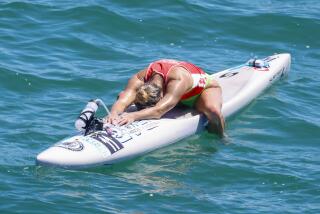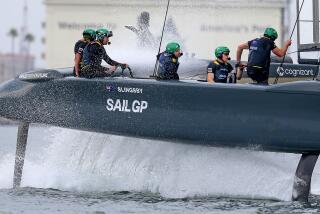SAILING / WHITBREAD ROUND THE WORLD RACE : Cruising Might Be on Way Out
FT. LAUDERDALE, Fla. — All but one of the 22 boats in the fifth Whitbread Round the World Race arrived at this stopover port by Saturday. On Monday, La Poste was still at sea.
At 51 feet, La Poste is the smallest and slowest boat in the race. It is manned by a crew of French postal workers that rotates at each stopover. The skipper is Daniel Malle, the former postmaster of Lyon. All seem to be having the times of their lives.
Tracking the painfully slow progress of La Poste on the bulletin boards is a pastime around race headquarters:
“La Poste radio contact 3 p.m. (Sunday): 250 miles out, doing 7.5 knots, ETA 1500 (3 p.m. Monday).” . . . La Poste radio contact 7 a.m. (Monday), 120 miles out, doing 6 knots, ETA 0300 (3 a.m. Tuesday).”
La Poste finally drifted in on light winds at 7:57 a.m., EDT, Tuesday. Overall, that placed it nearly two months behind first-place Steinlager 2 and two weeks behind the next slowest boat, With Integrity. Officials would like to shorten the nine-month duration of the race, and one way to do it would be to shorten the stopovers, which sometimes extend to a month for the faster boats.
So, it appears that they will phase out the slower boats, which are part of the charm of the race. They don’t think they can afford to wait for the La Postes anymore.
Jim Lutz of Los Angeles, crewing on the 15th-place, barebones-budget Liverpool Enterprise, said the experience has convinced him: “If a boat can’t afford to do it, they shouldn’t be involved.
“Certainly, the little guy can identify with these efforts, but it’s a big race. They slow the fleet down.”
Lutz, a substitute teacher for the L.A. Unified School District, is using the race as experience for the BOC single-handed around-the-world event.
His approach, he said, is “definitely not this way”--meaning, he intends to be fully sponsored.
“I’d rather go American,” Lutz said, “but I’ve had interest from the Japanese. I’ll go where the money is.”
The race has seven American sailors, one American-built boat and several American sponsors but no American entries.
Even Gatorade is Italian.
Half of the 22 boats have changed their names as they’ve changed sponsors. Belgium’s Rucanor Sport used to be Rucanor Tristar. France’s Charles Jourdan was Operation Cargo.
Britain’s With Integrity is the only boat to have sailed in all five races. She won the first two as Great Britain II in 1973-74 and 1977-78 but now sails in the Cruiser class and is placed 20th overall.
Some boats even changed nationalities. Belmont Finland was UBS Switzerland in the last race in 1984.
Sweden’s The Card--with one-third sponsorship by MasterCard--began as an American, and its original skipper wound up sailing for the Soviet Union.
“I tried to find money for an American sponsor,” said Skip Novak of Chicago. “I found a wealthy individual to risk some money and start building a boat.”
But he couldn’t find anybody to pay the day-to-day bills, so the boat was chartered to the Swedes, and Novak enlisted in the Soviet Union’s first big-boat campaign on Fazisi.
The first Soviet mistake was trying to build their own boat. They went for light, low, sleek and 82 feet, which is fine for a Transpac or an Ensenada race but too tender for the Whitbread.
“It was good in theory, it’s very well built, but the real-life situation is it has to be a very big boat (with) heavy displacement, big sail area,” Novak said. “These lighter boats just don’t crack it. They built this thing from their own think tank and by copying things they saw in Western magazines.”
Fazisi is 11th and The Card is fifth.
One American crew--U.S. Women’s Challenge--started the race at Portsmouth, England, on Sept. 2, but it was only a symbolic gesture. The campaign lacked funds even for the first leg and immediately turned back to port.
Since then, skipper Nance Frank has been traveling around the country trying to gain support for the 1993-94 event. It isn’t easy persuading people to take her seriously--or persuading Americans to take the Whitbread seriously.
On the eve of the race last fall, when Frank knew she wasn’t going to race, she gave away the boat’s perishable provisions to needy rivals. One paid her back.
“Fazisi’s cook is a man called ‘Rummy,’ ” Frank said. “When I saw Rummy here, the first thing he said was, ‘Ah, Nance, the strawberries!’ ”
Frank then asked Fazisi’s new skipper, Valerie Alexeev, if she and her all-woman crew could borrow the boat for a day.
“I couldn’t have gone to any other boat and had them say, ‘Sure,’ ” Frank said. “But they loved the strawberries. It was terrific.”
Unfortunately, Fazisi’s tattered mainsail tore during Frank’s outing, adding to the Soviet woes.
Frank also plans to sail the boat with three Soviet women sailors on May 2, three days before the start of the Whitbread’s last leg back to England. She also hopes to sail with them in the Soviet Union later.
Bob Salmon said he has “mixed feelings” about the final leg of the race.
The 54-year-old skipper of Liverpool Enterprise said: “When you spend so much time with any project, it takes over your life, so you have a feeling that one part of your life is coming to an end.
“I’m sorry it’s going to be over, (but) the worries really haven’t been worth the project.
“At the same time, it’s going to be the most competitive leg of the entire race. People are a bit glib that this is a 33,000-mile race and we have only 3 1/2 thousand to go, but 3 1/2 thousand is another transatlantic crossing, and everyone is going to be going hell for leather. Potentially, you might see more damage on this last leg than (on) the others.”
John Chittenden, skipper of Creighton’s Naturally, said: “A lot of people are out to prove what they haven’t proved so far.
“As an example, the British Rothmans boat (currently fourth) has got everything to go for. To arrive back in England first would almost vindicate their poor performance up to now.”
Chittenden, 49, said: “I would definitely do this race again if I weren’t as old as I am. As you get older, you become less competitive. You become more cautious.
“I’m a professional seaman--a ship’s master--and this (race) eats into good seamanship. The two things aren’t compatible.”
Whales are such a common hazard in the race that a collision with one is hardly noteworthy, although dangerous.
Rothmans skipper Lawrie Smith said: “They sleep unseen just below the surface and do not seem to hear yachts slicing toward them. My biggest worry is that one flick of a tail would be all that it takes to break a rudder.”
A Belgian entry, Rucanor Sport, had to quit the fourth leg after a whale damaged her rudder and hull, but later rejoined the race.
Charles Jourdan has hit two whales--one cracking a 10-foot-long hole in her side--and also had a dolphin dive through the headsail.
Besides Jourdane, 45; Lutz, 38, and Novak, 37, there are four other Americans in the race:
--Dawn Riley, 25, Detroit, engineer and watch leader on Britain’s Maiden, the race’s first all-woman crew.
--Erik Soper, 35, Norwalk, Conn., foredeck and maintenance on NCB Ireland.
--Rick Jakaus, 31, Boston, rigger on Italy’s Gatorade since his original boat, Finland’s Martela, lost its keel and capsized on the fourth leg.
--Bill Pearson, 32, Monroe, Conn., sail trimmer on Satquote British Defender.
More to Read
Sign up for The Wild
We’ll help you find the best places to hike, bike and run, as well as the perfect silent spots for meditation and yoga.
You may occasionally receive promotional content from the Los Angeles Times.






